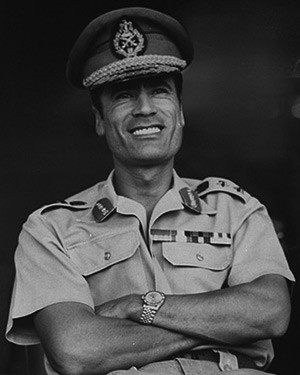The world's longest ruling head of state, Mu'ammar al-Qadhdhafi (the correct transliteration of his name), would have been ruler of Libya for exactly 42 years on Sept. 1. As he leaves the scene, his wretched reign deserves an appraisal.
 On taking power, Qaddafi was one of the most handsome of public figures. |
First, he had a key role in the increase in energy prices that began in 1972 and continues to this day. By challenging the international oil companies' control over petroleum production and pricing, he began the transfer of power from Western boardrooms to Middle Eastern palaces. Specifically, the chances Qaddafi successfully took helped bring about the four-fold increase in oil prices of 1973-74.
Second, Qaddafi kicked off what was then known as the Islamic revival and also still continues. At a time when no one else was ready to do so, he proudly and provocatively advanced Islamic causes by applying aspects of Islamic law, calling on Muslims worldwide to do likewise, and assisting any Muslims in conflict with non-Muslims.
Qaddafi's long rule can be divided into four eras. The first and most significant, 1969-86, consisted of frenetic activity on his part, meddling in issues and conflicts from Northern Ireland to the southern Philippines. An incomplete listing would include the near crippling of Jimmy Carter's 1980 re-election campaign by making payments to his brother Billy; declaring political union with Syria; aiding Iran militarily versus Iraq; threatening Malta over oil exploration in contested waters; bribing the Cypriot government to accept a Libyan radio transmitter; sending troops to southern Chad to control the country and unify with it; and helping a Muslim group in Nigeria whose violence left over 100 dead.
 Symbolic of his regime's decay, Qaddafi eventually became one of the ugliest public figures. |
That first era ended with the U.S. bombardment of 1986 in retaliation for the bombing of a discotheque in Berlin, which seemed to affect Qaddafi's psyche. His rabid adventurism dramatically declined, accompanied by a turn toward Africa and an ambition to build weapons of mass destruction. As his presence on the world stage shriveled, he was dismissed as a nut-job.
A third stage began in 2002, when a tamed Qaddafi paid reparations for the Libyan role in the 1988 downing of a Pan Am plane and gave up his nuclear ambitions. Although the fundamentals of his regime remained in place, he became persona grata in Western countries, while the British prime minister and American secretary of state paid their respects to him in Libya.
 Arguably, Qaddafi was even uglier in person than this caricature near Misurata. |
After decades of repression and deceit, Libyans now face the challenge of discarding that foul legacy. They must struggle to free themselves of paranoia, depravity, and contortion. As Andrew Solomon of the New Yorker summed up the problem, Libyans "may recover from the Qaddafis' embezzlement and brutality, but the falseness of life in the Great Socialist People's Libyan Arab Jamahiriya will take a long time to fade."
Indeed it will.
Mr. Pipes is president of the Middle East Forum and Taube distinguished visiting fellow at the Hoover Institution of Stanford University. © 2011 by Daniel Pipes. All rights reserved.
